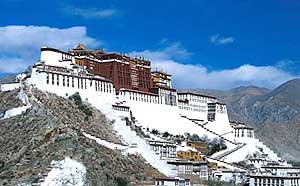Elvis in the land of monks
by Anirban Roy, Hindustan Times, April 20, 2007
Lhasa, Tibet (China) -- It’s been 48 long years since the Tibetan spiritual leader, the Dalai Lama, has been in exile in India. But they say that his heart is yearning to see Lhasa — the 1,300-year-old holy city. Lhasa has traditionally been the seat of Tibetan Buddhism and is regarded as the holiest centre in politically distressed Tibet.
 << Potala Palace, Tibet
<< Potala Palace, Tibet
The city I find is located at the bottom of a small basin, cupped by scenic mountains, and I am told that it sits at a height of 12,087 feet. The city used to be known as the highest capital in the world, but unfortunately it lost its status to La Paz, 11,913 feet, the administrative and de facto capital of Bolivia, after China annexed the Dalai Lama’s Tibet.
On top of the world
Despite the Dalai Lama’s long absence I marvel at the richness of Buddhist monasteries in the city. Tourists find it absolutely fascinating to be in a destination that sits on top of the world.
People from all over the world come here to enjoy the sunlight. The city is blessed with 3,000 hours of sunlight every year, more than any city of the world. That’s why it has earned its name: sunlit city.
My visit to Potala Palace, located on the highest point in Lhasa, the home of the Dalai Lamas, is educational. One can’t but soak in the ubiquitous spiritual wisdom here.
It is believed that the present 14th Dalai Lama, the face of global peace, has learnt all his major lessons of knowledge at this historic place.
In fact, the Dalai Lama’s Potala Palace is a beautiful work of ancient Tibetan architecture, and has the largest storehouse of rare Buddhist and Tibetan manuscripts.
Before I left for Lhasa, I had read that the UNESCO lists the Potala Palace as a world heritage site.
But it is conspicuous to notice that during the last five decades of Chinese rule, the city has undergone a major change: it’s become a regular modern day city.
Height of change
The roads are wide and well planned, weaving in and out of the historical city. Travelling is convenient for tourists; people have the luxury now to travel in swanky SUVs.
Tall buildings, skyscraper-like, have sprung out of the ground to touch the city’s sky; the Chinese government have started building flyovers now to manage the growing traffic on the roads.
Made in China
Chinese products too have entered the market and are seen stacked in cheap and attractive packages in the modern newly-built malls. The malls have created a shoppers’ paradise for keen tourists.
The young Tibetan women I see have given up their ‘Chuba’ (a traditional dress) and now prefer to sport colourful designer wear clothes. Most of the young and well-dressed girls are seen driving imported vehicles and zooming on motorbikes.
And while modernity treads to reach the roof of the world, people now don’t mind spending extra dollars on buying expensive and branded apparels. The modern shopping malls have strong local crowd, who now have a strong purchasing ability.
It’s easy to spot that snooker is the favourite recreation game for the youth. Almost every locality of Lhasa has at least half-a-dozen snooker clubs, and the new culture seems to grow like a wild fire.
The elders spend hours on playing cards, sipping tea and smoking Marlboro or 555 in posh tea cafés. Though English is still an alien language, roadside music stalls have introduced the Tibetans to western music and sell a lot of pirated music CDs and DVDs. While there is a strong Bollywood craze in modern Lhasa, Elvis Presley and Elton John are hot favourites among the guitar-playing Tibetans.
The new upmarket restaurants and bars mint huge money on packaging their cuisine to western taste: the Yak sizzlers and Yak-steaks have replaced the ‘Thukpa’ (traditional Tibetan noodles) and the ‘Tumba’ (drink made from Millet) to Lhasa Draft Beer.
Back to the future
Lhasa’s journey to modernity is now viewed with a lot of scepticism. The sudden leap maybe the cause of a major crisis in future. The transition from tradition to modernity cannot be so sudden.
Many visitors to the ancient city believe that people here should try and preserve their tradition for the future.
The Dalai Lama’s city has already started facing major problems: prostitution, drug addiction and gambling. And a time may soon come that the great history of the ancient holy city would be totally wiped out.
Should the countdown for Lhasa’s reverse journey to tradition from fake modernity begin now and that too from Dharamshala?

 << Potala Palace, Tibet
<< Potala Palace, Tibet